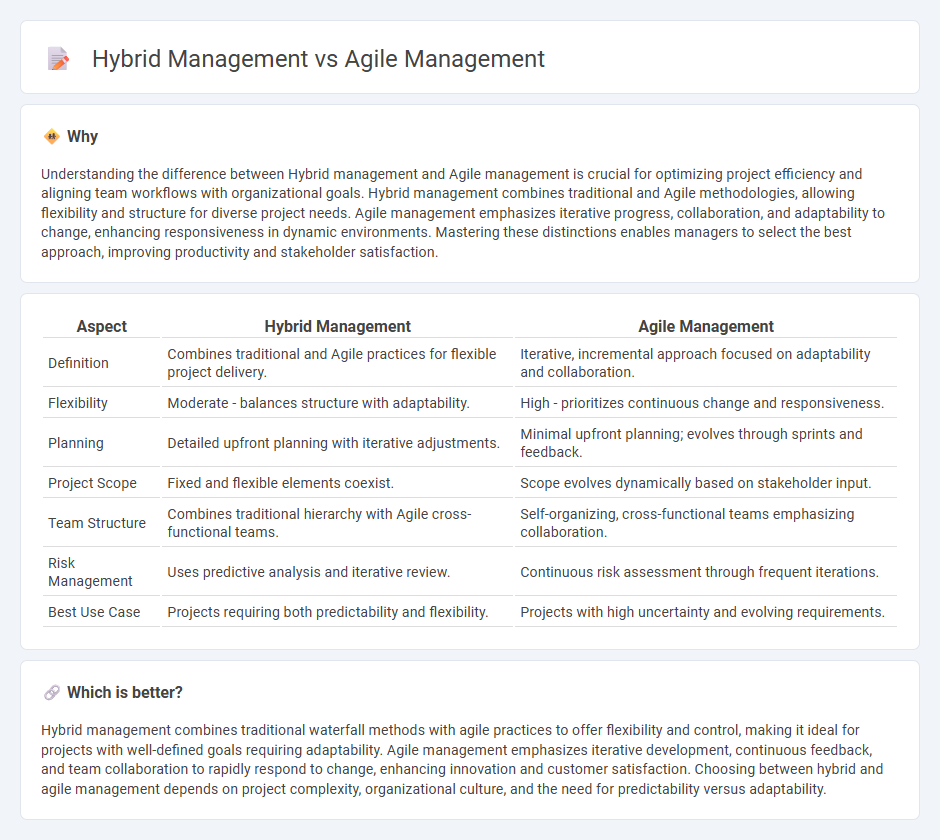
Hybrid management combines traditional project management's structured frameworks with Agile's iterative and flexible approaches, enhancing adaptability in complex environments. Agile management emphasizes collaboration, customer feedback, and rapid delivery to drive continuous improvement and responsiveness. Explore how integrating these methodologies can optimize project outcomes and organizational efficiency.
Why it is important
Understanding the difference between Hybrid management and Agile management is crucial for optimizing project efficiency and aligning team workflows with organizational goals. Hybrid management combines traditional and Agile methodologies, allowing flexibility and structure for diverse project needs. Agile management emphasizes iterative progress, collaboration, and adaptability to change, enhancing responsiveness in dynamic environments. Mastering these distinctions enables managers to select the best approach, improving productivity and stakeholder satisfaction.
Comparison Table
| Aspect | Hybrid Management | Agile Management |
|---|---|---|
| Definition | Combines traditional and Agile practices for flexible project delivery. | Iterative, incremental approach focused on adaptability and collaboration. |
| Flexibility | Moderate - balances structure with adaptability. | High - prioritizes continuous change and responsiveness. |
| Planning | Detailed upfront planning with iterative adjustments. | Minimal upfront planning; evolves through sprints and feedback. |
| Project Scope | Fixed and flexible elements coexist. | Scope evolves dynamically based on stakeholder input. |
| Team Structure | Combines traditional hierarchy with Agile cross-functional teams. | Self-organizing, cross-functional teams emphasizing collaboration. |
| Risk Management | Uses predictive analysis and iterative review. | Continuous risk assessment through frequent iterations. |
| Best Use Case | Projects requiring both predictability and flexibility. | Projects with high uncertainty and evolving requirements. |
Which is better?
Hybrid management combines traditional waterfall methods with agile practices to offer flexibility and control, making it ideal for projects with well-defined goals requiring adaptability. Agile management emphasizes iterative development, continuous feedback, and team collaboration to rapidly respond to change, enhancing innovation and customer satisfaction. Choosing between hybrid and agile management depends on project complexity, organizational culture, and the need for predictability versus adaptability.
Connection
Hybrid management integrates Agile management principles to balance flexibility with structured project control, enabling teams to adapt quickly while maintaining overall project direction. Agile management emphasizes iterative development, collaboration, and responsiveness to change, which are core components embedded within hybrid frameworks. This connection allows organizations to tailor workflows by blending Agile's adaptability with traditional management processes for optimized efficiency and delivery.
Key Terms
**Agile management:**
Agile management emphasizes iterative development, continuous feedback, and adaptive planning to enhance project flexibility and team collaboration. It prioritizes quick response to change and customer-centered delivery, making it ideal for dynamic environments and software development. Explore further to understand how Agile management transforms project outcomes and drives innovation.
Iterative Development
Agile management emphasizes iterative development through continuous feedback loops, rapid prototyping, and adaptive planning to enhance flexibility and product quality. Hybrid management combines Agile's iterative cycles with traditional waterfall phases, balancing strict project control and adaptability to meet diverse project requirements. Explore our detailed analysis to understand how iterative development varies between Agile and Hybrid management frameworks.
Self-Organizing Teams
Agile management emphasizes self-organizing teams that autonomously plan, execute, and deliver value through iterative cycles, promoting flexibility and continuous feedback. In contrast, hybrid management blends traditional hierarchical oversight with agile principles, allowing self-organizing teams to operate within structured frameworks to balance innovation and control. Explore deeper insights into how self-organizing teams function within both management styles for optimized project outcomes.
Source and External Links
What is Agile? - Project Management Institute - Agile is an iterative approach to work that helps teams deliver value faster, emphasizes adaptability, customer collaboration, and continuous improvement through small, incremental steps.
What Is Agile Methodology? (A Beginner's Guide) [2025] - Asana - Agile methodology breaks projects into dynamic phases (sprints), prioritizes individuals, working software, customer collaboration, and responding to change over strict processes and plans.
Agile Methodologies in Management Courses - UCLA Extension - This specialization teaches how to apply agile frameworks like Scrum and Kanban to enhance productivity, adapt to change, and scale agile practices across organizations.
 dowidth.com
dowidth.com